Latest episode
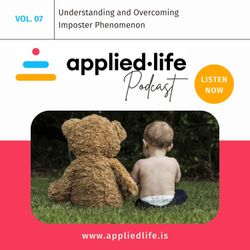
7. Understanding and Overcoming Imposter Phenomenon
27:07||Season 1, Ep. 7Nell speaks with business psychologist and coach Bettina Koerner about her recently completed Master’s Thesis, which focuses on the connection between perceived social background and imposter phenomenon. Nell and Bettina discuss Bettina’s research in depth, touching on the root causes of imposter phenomenon, its relation to Pierre Bourdieu’s Habitus theory, and how imposter phenomenon is affected by perceived social or psychological disadvantages, including feelings of discrimination among minority groups. They also discuss strategies that individuals and organizations can use to overcome imposter phenomenon to unlock true potential. Related Resources: Project Implicit: https://implicit.harvard.edu/ The Equality and Human Rights Commission: https://equalityhumanrights.com/en The Charta Der Vielfalt Diversity Study (2020): https://www.diversity-trends.de/#inhaltCharta The Charta Der Vielfalt Diversity Fact Sheet: PDF Factsheet Link (https://www.charta-der-vielfalt.de/fileadmin/user_upload/Studien_Publikationen_Charta/Charta_der_Vielfalt_Factsheet_Soziale_Herkunft.pdf)
More episodes
View all episodes
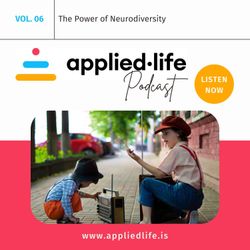
6. The Power of Neurodiversity
41:25||Season 1, Ep. 6In this podcast episode, Nell speaks with Dr. Thomas Armstrong, a psychologist, author, and educator whose research has focused on topics such as neurodiversity, adolescent learning, and human development. Thomas shares his research-based insights on neurodiversity and discusses the benefit of taking a strengths-based approach with all learners. Additional topics covered include positive niche construction, neuro-equality, and supporting neurodivergent individuals in community. Nell also discusses Thomas's most recent book, the novel Childless. Related ResourcesFor more on neurodiversity: understood.orgFor more on ADHD: Jessica McCabe's website howtoadhd.com For more on giftedness: mensa.org For more on Dr. Thomas Armstrong: institute4learning.com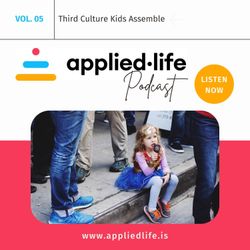
5. Third Culture Kids Assemble
41:42||Season 1, Ep. 5In this episode, Nell and Professor Christian van Nieuwerburgh discuss their experiences as Third Culture Kids – individuals who spent a significant part of their developmental years in one or more countries outside their parents’ culture. Nell and Christian have both a personal conversation about their own experiences as well as a larger discussion about the role of TCKs in education and society. They discuss common struggles faced by TCKs, how to support TCKs in the educational system, and the unique strengths and skills TCKs bring to their work and communities. If you’re interested in more resources or information regarding Third Culture Kids, please email us at team@appliedlife.is. Our GDPR privacy policy was updated on August 8, 2022. Visit acast.com/privacy for more information. Related Resources: · Book by David Pollock and Ruth Van Reken - Third Culture Kids: Growing Up Among Worlds· A non-profit organization that provides resources and support to TCKs: https://www.tckidnow.com/· An online magazine that represents TCKs (also on Facebook) https://denizenmag.com/third-culture-kid/· Professor Christian van Nieuwerburg’s website: https://www.growthcoaching.com.au/team-member/prof-christian-van-nieuwerburgh/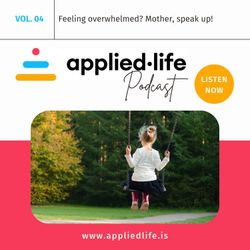
4. Feeling overwhelmed? Mothers, speak up!
37:17||Season 1, Ep. 4In this podcast episode, Nell and Kiera talk about parental overwhelm and parental burnout, which predominantly still concerns mothers. They share background information on culture and social development, mention typical stressors and possible ways to reduce them, and offer lots of resources that contribute to parental wellbeing. If you’re interested in more resources or conversations with Kiera and Nell, please email us at team@appliedlife.is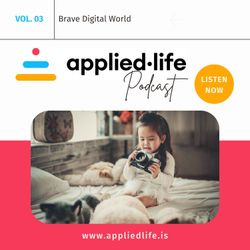
3. Brave Digital World
39:13||Season 1, Ep. 3Nell and Franz talk about the phenomenon of escapism from discomfort due to increased complexity in the world and increased availability of digital consumption goods with insights into what kind of skills are needed to deal with discomfort and complexity.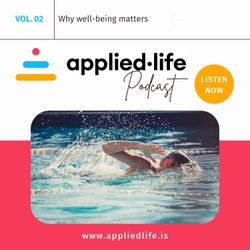
2. Why well-being matters
37:06||Season 1, Ep. 2Nell and Bernadette have a conversation about the understanding of well-being, how well-being matters on an individual, social, and organizational level, and where and how to start thinking differently about well-being when trying to overcome old habit energies and moving from surviving to thriving.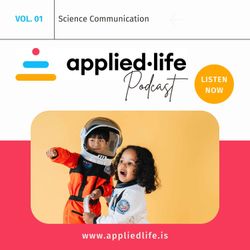
1. Science Communication
23:05||Season 1, Ep. 1Nell and Julia have a conversation about scientific sources and how they can be made available for non-scientists, what the difference is between science communication and journalism, and how understanding content and language from different sources should be taught in school.
